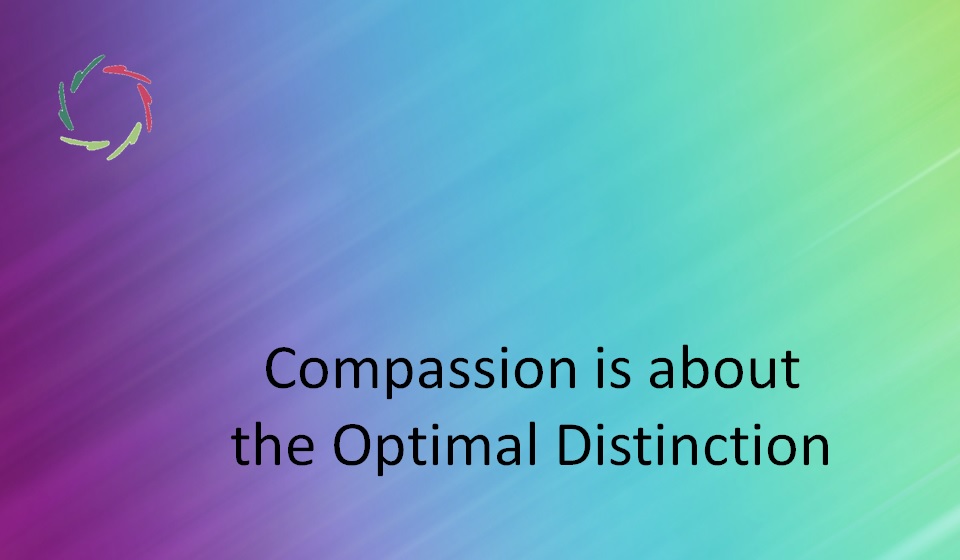Religion and Compassion

Compassion = Open Religion?
Please read first [see: “Essence of Compassion“] to get a feel of appropriate un-easiness. That is always a good start towards Compassion.
Compassion, the road towards nonbelief
A belief in a conceptual anything is not religious in my use of terminology.
I foresee a gentle slope towards Open Religion [see: “What is Open Religion?“]. In my view, Compassion is a good way – probably the only right way – to facilitate this. It is Open by nature, and it makes Open to nature. To attain Religious Openness, what is worthwhile should be kept. People in transit should have the profound experience that they are losing nothing crucial.
Yes, any individual’s belief – always just one in thousands of possible options – can diminish or evaporate through the influence of a Compassionate view. What lies behind the concrete belief is more important. With transparent belief, that becomes more visible.
Even more, what becomes visible is Compassion itself.
Compassion = Open Religion?
I think so.
A Compassionate feeling can be seen as the essential religious feeling: a deep relatedness to someone or something, always with a personal edge. In most religions, the divine is personal, and the relationship is a deeply personal one. Warmth is present. Also, this divine relation can be felt in one’s relation to other people. For instance, in Catholicism: “Where two of you are together, I am in your midst.”
Even if the relation to one’s God is purely individual – no other people involved – it feels like a personal relation, whether conceptual (for instance, feeling close to Christ) or non-conceptual (a purely abstract feeling). Ethics plays a crucial role in this in any genuine religion, as in Compassion. Doing good for others is doing good for the divine. In this, time and again, religion invites (or exhorts) the believer to transcend mere-ego.
Surely, if one asks for respect for any specific religion, Compassion can be put forward asking respect for itself as well. I think it deserves the most respect since it is most direct. Compassion combines religiosity with rationality. No belief is necessary for this.
Conceptual and non-conceptual
In the original stage of most religions, if depth is seriously involved, the direction towards ‘God’ is non-conceptual to such a high degree that it can also be attained as conceptual. Otherwise, the non-conceptual itself would be ‘non-this-but-that,’ therefore, conceptual.
Which would be a contradiction. The non-conceptual doesn’t make conceptual distinctions. Any interesting notion of an ultimate being is therefore conceptual and non-conceptual. Many religions do not have a proper answer to this. They take the simplest choice, which leaves much about them in tension. In many cases, it’s the mystics who encounter this tension most head-on. Take Rumi. Take Meister Eckhart.
Compassion is fundamentally conceptual and non-conceptual. It takes into account the whole reality. It is an act of faith. It continually transcends the simplest choice.
Deep faith
To me, the term ‘faith’ is less object-oriented than ‘belief.’ Therefore, the concept is more interesting in a religious sense and lies closer to Compassion.
Deep faith = deep doubt.
It’s like a half-filled glass of water. Being-half-filled is one way of looking at the glass; being-half-empty is another way. Both are about the same half-filled glass of water. If you go to space, put a lid on the glass, and shake it, you get an emulsion of water in air. It’s still the same half-filled glass of water.
There is no deep faith without deep doubt, and there is no deep doubt without deep faith.
Common factors
In psychotherapy, the methods and theories are irrelevant by themselves. [see: “Psychotherapy vs. Psychotherapies“] Since psychotherapy does work, the only viable conclusion is that it works through the so-called common factors. In my take towards simplicity, these are placebo and empathy.
Placebo does not accord with AURELIS values. That leaves us with empathy. Deepening empathy, you get Compassion.
In religion, one can see many ‘methods and theories.’ Since religion does work (many people get deeply religious feelings), the only viable conclusion is the same.
Common Compassion
To me, this is one more excellent reason why, in psychotherapy and psycho-somatic medicine, a profound endeavor to bring truth is crucial. It brings people to themselves, this way also in the domain of religion. At least, they get the strength and the knack to do so. The psychotherapist doesn’t need to make this explicit.
The future of religion is Open Religion is Compassion. In my view, this doesn’t denigrate any specific religion. It deepens it, making it more valuable in its symbolic guise. I acknowledge that one consequence of this is the loss of comfort. Open Religion turns out to be much more demanding.
So, what are we waiting for?


